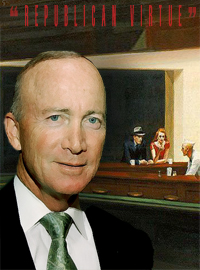| Mitch Daniels: A Study in Political Character |
 |
|
By Troy Senik
Thursday, June 21 2012 |
In “The Restaurant at the End of the Universe,” Douglas Adams wrote “It is a well known fact that those people who most want to rule people are, ipso facto, those least suited to do it … anyone who is capable of getting themselves made President should on no account be allowed to do the job.” While Adams was presenting the line in a fictional context, it was hard to miss the application to American politics. Written in 1980, the book arrived with the memory of Richard Nixon’s presidency still fresh. And, with Jimmy Carter inhabiting the White House, the idea of abolishing the presidency outright may not have seemed unreasonable at the time. Today, more than three decades later, Adams’ quip still has an unfortunate resonance, though not just in the context of the presidency. Elected office, no matter at what level, increasingly seems to be a line of work suited only for the venal, the vainglorious, and the downright pathological. And, alas, the exceptions prove the rule. Take, for example, Indiana Governor Mitch Daniels. In a field where a lifetime of political climbing is endemic (Joe Biden, for instance, won his first election – for a spot on the New Castle, Delaware City Council – a year after graduating from law school and never looked back), Daniels has never evinced a hunger for power. While he spent much of his adult life around American politics, serving as a staffer to Richard Lugar, Ronald Reagan and George W. Bush, Daniels never became a part of Washington’s institutional elite, choosing instead to run a conservative think tank and serve as a business executive in his hometown of Indianapolis when he wasn’t occupied serving the country. Though he had plenty of opportunities prior (he even turned down an appointment to the U.S. Senate in 1988 so that he wouldn’t have to spend too much time away from his family), Daniels didn’t seek elected office until 2004, when, at the age of 55, he ran for and won the position of Governor of his home state of Indiana. It wasn’t that Daniels was a late political bloomer – it was simply that his rationale was to help the people of his home state, not to advance his personal ambitions. On the Governor’s official website, a venue that most state executives fill with little more than political pap, he notes, “Indiana's young people are the reason I ran for Governor. I heard from countless young Hoosiers that they wanted to grow up and live in Indiana, but they were afraid they wouldn't be able to find a good job in our state. We hope to change that so when it comes time for you to start your family, you will continue to call Indiana your home.” And he’s done precisely that. As George Will noted in a column last year, “Under him, Indiana has its fewest state employees since 1978, the nation's lowest state-government employment per capita, the lowest effective property taxes and the third-lowest per capita spending.” To drive home the point that his time in office was about his constituents and not himself, Daniels explicitly campaigned for reelection in 2008 on the pledge that it would be the last election of his life. Earlier this week, when the news broke that he most likely would become president of Purdue University upon leaving office at the beginning of next year, it became clear that the pledge was more than a political gimmick – a distressing reality to many conservatives, who, having hoped for a Daniels presidential campaign, attempted to mollify themselves with the idea of the Hoosier State governor sharing a ticket with Mitt Romney. Yet it should have come as no surprise that Daniels would be – on this issue, as with every other – a man of his word. Anyone who once said – as Daniels did – “You’d be amazed how much government you’ll never miss,” is not possessed with the sort of lust for power that leads one to mortgage his entire existence for political ambition. Characteristically grounded, Daniels announced his decision to forego the presidential race last year by saying, “I love my country. I love my family more.” The only thing more remarkable than the sentiment is the fact that it came from someone who had successfully won statewide office twice. As Daniels prepares to leave the political stage in about six months, conservatives would do well to think about how they can bring more men of his moral fiber onto the political stage. Daniels in many ways embodies the principle once known as “republican virtue” – the idea that public service is a duty to be shouldered rather than an ambition to be fulfilled; that the virtuous leader governs according to the long-term interests of his constituents rather than the short-term exigencies of politics; and that, upon completing service, one has a duty to fade away quietly from public life. It was the mindset that led George Washington to voluntarily relinquish power after two terms as president. It was the mindset that led Calvin Coolidge (himself a sort of proto-Daniels) to say, “perhaps one of the most important accomplishments of my administration has been minding my own business.” And it was the mindset that anchored Mitch Daniels’ time at the statehouse in Indianapolis. There’s an evergreen temptation among conservatives to attempt to impose this sensibility through policy, such as in the push for term limits. While that might be helpful, attempting to invent new ways to restrain politicians will always be inferior to electing people so prudent in their exercise of power that they restrain themselves. Mitch Daniels has demonstrated to a new generation of conservatives that such figures still exist. On that basis alone, he has already left a more impressive legacy than many presidents could ever dream of. |
Related Articles : |
























